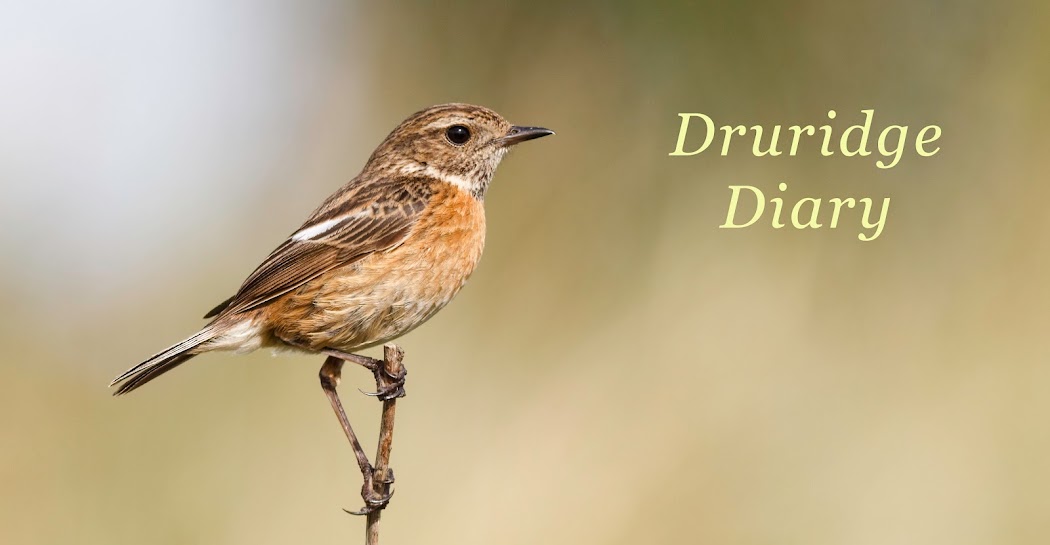When I did go, it felt odd - almost like I was doing something wrong. I've quite enjoyed exploring my new (very) local patch, rediscovering places I used to knock around as kid and probably first developed a love of the outdoors and wildlife, abandoning my re-found patch for Druridge felt like cheating. So after my first visit I returned to the local haunts for a few days.
Obviously there was a lot of new birds for the year - chiffchaff was the only warbler I saw before lockdown, now they are all back and the hirrundines, swifts and seabirds.
I didn't take my camera on my first few visits - again it felt as if I should be exercising, not taking photos. I missed a lovely Greenland wheatear posing nicely on a post and a yellow wag on the budge fields.
The Budge fields are looking great at the moment, but are drying up quickly in this dry weather (the driest May since the 50's seemingly) and have attracted a good selection of waders, on 19th I had greenshank, avocet, little stint, ruff, knot and black-tailed godwit. On Friday the wader list also included three curlew sandpiper, two little-ringed plover and a bar-tailed godwit. A drake garganey was also on the Budge fields.
I normally avoid Bank Holidays at Druridge. I headed out early on Bank Holiday Monday and left before the masses descended. A red-legged partridge, a scarce visitor to the patch, was on the Budge fields - I hope they remain scarce otherwise we'll lose our greys.
 |
| red-legged partridge - an unwelcome year-tick |
30-40 swifts were feeding just over the bushes along with black-headed gulls, taking advantage of the St. Mark's Flies.
 |
| Swifts - difficult to photograph |
 |
| Black-headed gull - hawking insects amongst the bushes |
On Thursday and Friday I took two days off work to set up the ringing the site. I only put three nets up on each day but still caught 48 new birds, a few retraps and single control blue tit. We didn't ring at all last year because of family circumstances, so any retraps were at least two years old.
Warblers dominated, mostly adults showing signs of breeding but I did catch a recently fledged juvenile chiffchaff. A couple of grasshopper warblers and a lesser-whitethroat were nice to catch - the latter, a female with a brood patch, are not a common breeding species here.
 |
| Lesser whitethroat - a rare breeding species at Druridge |
On Friday, a spoonbill was on the Budge fields first-thing and, weirdly, 22 barnacle geese. There had been lots of fly-over feral goose flocks, mostly Canadas. I can only presume these barnacles were feral rather than 'wild' migratory birds?
When things were quieter in the nets, I had a chance between checks to photograph some critters. I found my first red and black froghopper at Druridge a couple of years ago - there were dozens of them on Thursday and Friday. A coloniser from the south, like speckled wood butterflies.
 |
| Red and black froghopper- Cercopsis vulnerata |
I also photographed this beetle:
 |
| Red-headed Cardinal Beetle (Pyrochroa serraticornis) |
Red-headed Cardinal Beetle (Pyrochroa serraticornis) - a new one for me. It looks like another southern species establishing here. I saw three or four over the two days whilst checking nets. According to the NBN atlas the most northerly record St. Mary's Island and iNaturalist has couple of sightings locally but nothing as far north as Druridge.
There were a few butterflies on the wing including large skipper and small heath. There were also dozens of blue-tailed damselfy.
 |
| Small Heath |
 |
| Blue-tailed damselfly (female) |
 |
| Blue-tailed damselfly |
I left at about 1.30pm on Thursday and the road was jammed with cars - Friday was worse. I was using our southern nets so it was more obvious but as I drive home, it was gridlock - a single track road with cars parked on both sides and wazzocks not giving way. Cars were parked almost continuously from Druridge to Cresswell - I've not seen this before, even on August Bank Holiday Monday. I can only presume these people are usually in the Metro Centre or the pub...
 |
| Chaos |


No comments:
Post a Comment